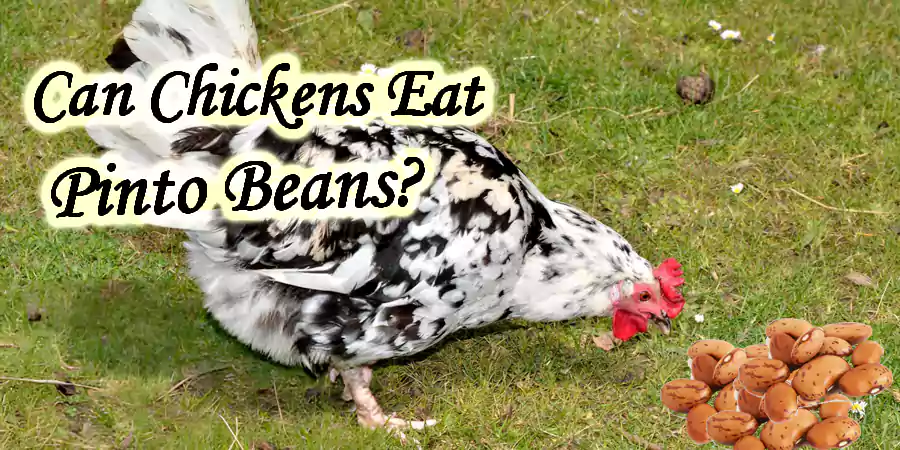Can Chickens Eat Bell Peppers? Essential Facts Revealed!
Published: 7 Sep 2024
Your concerns about chicken’s diet look genuine. To ensure the safety and optimal growth of our flock we will explore each aspect of the food to have a clear solution of: can chickens eat bell peppers? Chickens can enjoy eating these colorful veggies in small amounts. But we have to equip ourselves with a definite knowledge related to the nutritional benefits and potential pitfalls of feeding bell peppers to backyard chickens. So, let’s make bell peppers safe for chickens by learning about their preparation and feeding methods.
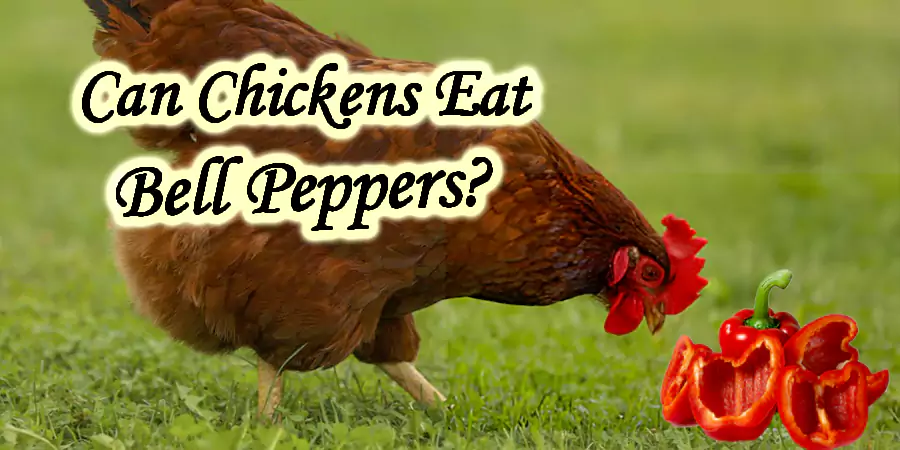
Can Chickens Eat Bell Peppers? Essential Facts Revealed!
Is Bell Pepper safe for Chickens?
Yes, bell peppers are safe if served with some simple precautionary measures. It is not a primary diet for the clucking birds, so you have to keep its portion to a minimum level. It has some healthy nutrients supportive of the chicken’s growth. Excessive use will ruin all its benefits and can cause nutritional deficiency in the flock.
Nutritional Profile of Bell Peppers
Bell peppers have a notable amount of nutrients. We will discuss the main nutrients and their impact on chicken’s health. Here is a breakdown of the key nutrients of Bell peppers:
Vitamin A: Like Banana Peppers, Bell peppers are also good source of vitamin A. It supports vision and improves the immune functions, and skin health of chicken’s health.
Vitamin C: Bell pepper contains a high volume of vitamin C which is good for boosting the immune system of chickens. It reduces the oxidative stress in the flock.
Fiber Content: It provides dietary fiber that supports the digestive system of chickens. It is helpful in bowel movement and a healthy gut in the flock.
Minerals: Bell peppers are packed with essential minerals like potassium and magnesium. They are anti-inflammatory and improve muscle health in chickens.
Antioxidants: Bell peppers are filled with a high volume of flavonoids and carotenoids which are helpful antioxidants to prevent cell damage in chickens.
How to Feed Bell Peppers to Chickens?
Bell peppers should be properly prepared to make them safe and healthy for the flock. Here are some simple preparatory steps for your assistance:
- Choose Fresh Bell Peppers: We advise you to serve only fresh bell peppers and remove the peppers with mold. Spoiled veggies are harmful to chickens.
- Decontaminate Bell Peppers: After selecting the fresh bunch of bell peppers, now wash them thoroughly with water till all dirt or pesticide residues are completely removed.
- Remove the Seeds and stems: Bell pepper seeds are not healthy for chickens. Stems are fibrous parts and can cause digestion problems in chickens.
- Cut Bell Peppers into small Pieces: Chickens love to have chopped or sliced veggies in their treat. So, cut them into small pieces which are easy to consume for the flock.
- Introduce Gradually: Introduce bell peppers in small volume. Check for their response and gradually increase the volume of bell peppers in the routine diet of the flock.
- Mix Bell peppers with other Feed: To make it more enticing for chickens you can mix bell peppers with their favorite foods.
Can Baby Chickens Eat Bell Peppers?
Yes, baby chickens can have bell peppers in their treat with some extra care. We prefer a commercially formulated diet for chicks in the first eight weeks. During this period their nutritional needs demand more than offered by bell peppers. Additionally, their delicate digestive system and weak immune system couldn’t handle them easily.
After eight to twelve months you can serve chopped bell peppers mixed with a routine diet to chicks. Remove the hard and fibrous stems of bell peppers to prevent choking issues. Bell pepper seeds are not recommended for chicks. After removing seeds and stems, serve bell peppers in moderation to baby chickens.
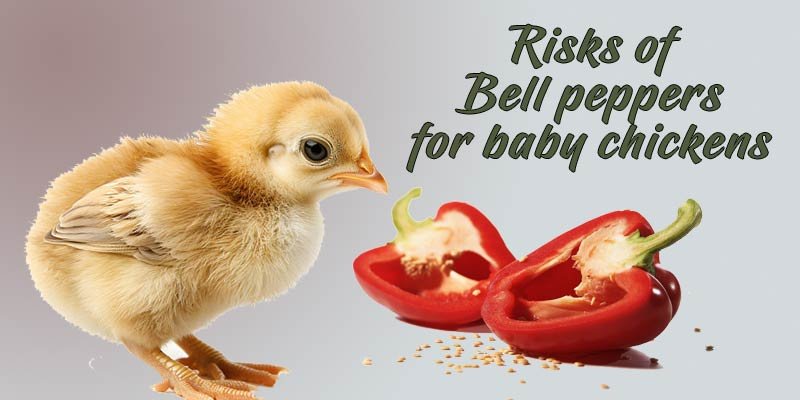
Can Chickens Eat Bell Peppers Everyday?
No, everyday use of bell peppers is not recommended for chickens. In fact, we are against the daily use of any single food for chickens. Chickens like to have varied diet plans otherwise they show a lack of interest in their diet. Additionally, excessive use of bell peppers will lead to nutrient imbalance in the flock. Bell pepper is a supplementary food for the flock. So, avoid serving bell peppers daily to your flock.
Which Parts of Bell Peppers are Edible for Chickens?
Can Chickens Eat Bell Peppers Seeds?
No, we are not in favor of serving bell pepper seeds to the backyard clucking birds. The seeds can be problematic for chickens to digest properly. They are not very toxic and chickens can have them in moderation. Removing them is a safer and healthier option for chickens. So, avoid bell pepper seeds for your chickens.
Can Chickens Eat Bell Peppers Stems?
No, bell pepper stems are not recommended for chickens. They are hard and fibrous parts of bell peppers. Chickens might face difficulty in digesting these fibrous stems. Bell pepper stems can cause choking issues for chickens. The nutritional value of stems is not enough to ignore the risk of blockage in the flock.
Can Chickens Eat Bell Pepper Leaves?
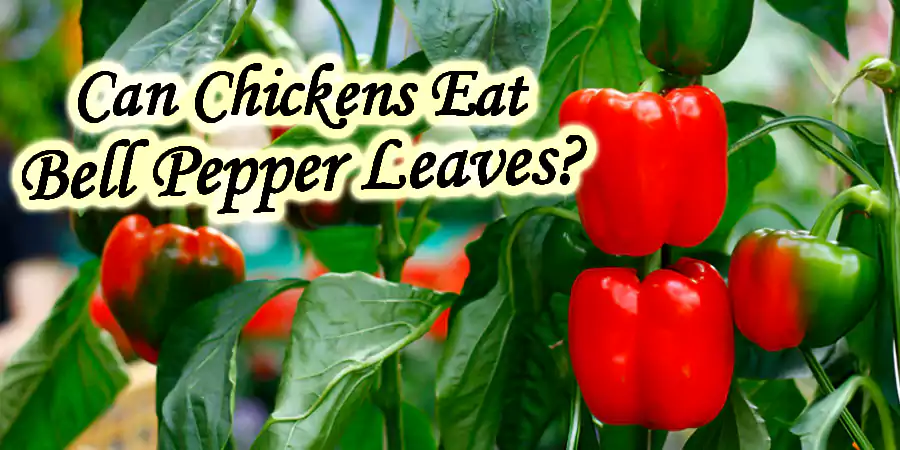
No, bell pepper leaves are not recommended for chickens. Like other nightshade vegetables (eggplant and tomatoes) bell pepper also contains some harmful compounds which can be toxic for chickens. Bell pepper leaves carry some of these compounds. So, we are not in favor of offering bell pepper leaves to the flock.
Can Chickens Eat Bell Pepper Scrapes?
Yes, chickens can have bell pepper scrapes including their flesh. Chickens like the crunchy texture of bell pepper scrapes. We advise you to properly prepare the bell pepper scrapes as mentioned above. Chop them into small pieces easy to consume for chickens. Always incorporate bell pepper scrapes sparingly into the routine diet plan of chickens.
What Colors of Bell Peppers are recommended for Chickens?
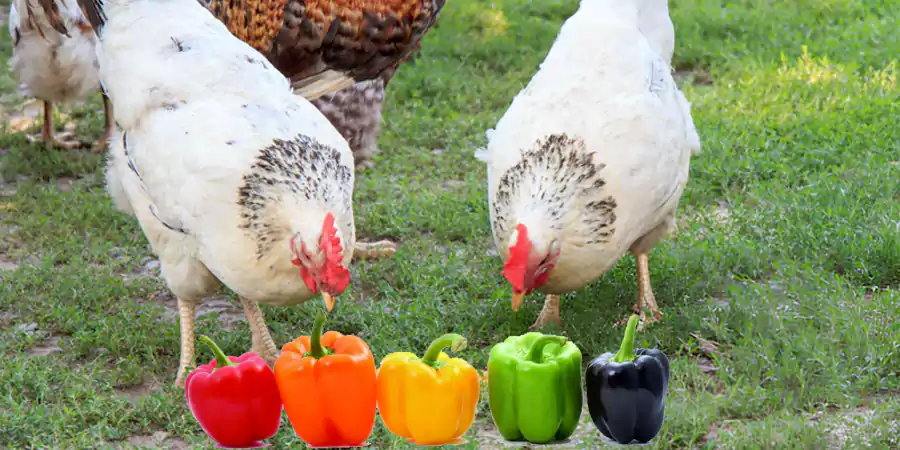
Can Chickens Eat Yellow Bell Peppers?
Yes, chickens can have yellow bell peppers. They are safe and nutrient-rich veggies for chickens. Yellow bell peppers provide antioxidants, which help reduce oxidative stress in chickens. Properly prepare them as directed above. Cut them into small pieces to make digestion easier for the flock. Avoid serving stems and seeds of yellow bell peppers.
Can Chickens Eat Red Bell Peppers?
Yes, red bell peppers are safe and nutritious for the flock. Chickens can easily consume them without any significant risks. Red bell peppers are packed with vitamins A and C, which are good for chickens’ overall growth. The stems of the peppers are not recommended due to their hard texture. Chop red bell peppers into manageable pieces to prevent choking hazards for chickens.
Can Chickens Eat Green Bell Peppers?
Yes, chickens can comfortably munch on green bell peppers. They contain a good amount of nutrients that are essential for the optimal and healthy growth of backyard chickens. Like red and yellow bell peppers, chop or slice green bell peppers into small pieces. Serve green bell peppers sparingly and keep their portion under 10 % of the total diet of chickens.
Can Chickens Eat Orange Bell Peppers?
Yes, chickens can have orange bell peppers with ease. They are full of vitamin C which is good for building the immune system in chickens. Refrain from serving whole orange bell peppers to your flock as it can cause choking issues. Mix them with a routine diet of backyard friends. Moderation is key to making orange bell peppers safe and healthy food for chickens.
Can Chickens Eat Purple Bell Peppers?
Yes, chickens can munch on purple bell peppers with caution. You can only serve them as an occasional diet of chickens. Overuse will lead to nutritional deficiency in chickens. Always focus on offering a well-balanced diet to the flock. Like other types of bell peppers, stems and seeds of purple bell peppers are not recommended for your clucking birds.
In What form Bell Peppers should be served to Chickens?
Can Chickens Eat Raw Bell Peppers?
Yes, chickens can eat raw bell peppers in moderation. The crunchy texture of raw bell peppers will induce the flock to peck at them. Raw bell peppers are packed with vitamins, minerals, and antioxidants. Always clean and chop them before serving to your flock. Avoid serving harder parts of bell peppers to chickens. We have not recommended the use of stems and seeds of bell peppers. Keep its portion to a minimum level and focus on well-balanced foods.
Can Chickens Eat Cooked Bell Peppers?
Yes, chickens can have cooked bell peppers with caution. The cooking will make them softer and easier to digest for the flock. Additionally, it will minimize the choking risks for chickens. You should not add any artificial flavor, seasonings, salt, or oil during the cooking process. Chopping the bell pepper before cooking will make things easier for the flock. So, we recommend cooked bell peppers for chickens.
Can Chickens Eat Whole Bell Peppers?
No, we are not in favor of serving whole bell peppers to chickens. It will increase the chances of choking in the flock. Additionally, chickens will not like to have larger pieces of bell peppers in their treat. So, we suggest to chop them into small pieces according to the size and age of your flock. Observe the response of your flock and manage their size accordingly.
Benefits of Bell Peppers for Chickens
Bell peppers contain a good range of nutrients that support the healthy growth of chickens. Here is a list of some common benefits of feeding bell peppers to our flock:
|
What are the negative side effects of Bell Peppers?
Bell peppers might have some negative impacts on chicken’s health. Identifying the risks in the initial stage will mitigate the effects. Here is a list of some common hazards associated with bell peppers:
|
Effects of Solanine on Chickens:
Like other nightshade vegetables, Bell Peppers also contain solanine risk. It can be toxic for chickens if served in excessive amounts. The main effects or symptoms of solanine are:
|
Alternatives of Bell Peppers for Chickens
If you want to explore more food ideas as an occasional diet for your flock then consider these vegetables. Here is a list of safe and nutritious veggies for our backyard clucking friends:
- Carrots: Carrots are packed with vitamins A and K. They support immune functions and blood clotting in chickens. Served in small pieces.
- Zucchini: Zucchini is one of the favorites of chicken enthusiasts because of its high water content. It prevents dehydration and can be served raw or cooked.
- Squash: Squash is loaded with vitamins A and C. It boosts immunity in chickens. There are many types of squash recommended for chickens.
- Broccoli: Broccoli helps strengthen the bones. It provides vitamin C and K. Chickens love to peck at Broccoli. Serve it in small pieces.
- Kale: Kale is packed with vitamins A, C, and K. Kale improves the immune system of chickens. It is good for the overall health of chickens.
- Spinach: Spinach is one of the famous leafy greens served to chickens sparingly. Spinach is full of vitamins A, C, and K. Serve it in moderation.
- Banana Peppers: Banana peppers are also good for chickens in limited volume. It provides vitamins A and C. Serve after proper preparation.
Conclusion
We have concluded that chickens can eat bell peppers in moderation. Ensure that bell peppers should be fresh and properly ripe to avoid digestive issues. The concentration of solanine is higher in some parts of bell peppers which should be avoided. We recommend the removal of seeds and stems of bell peppers.
Introduce bell peppers in small quantities and observe their reaction. Moderation is the most important factor in making bell peppers safe for chickens. If there is any sign or symptom of solanine effects, immediately consult with a professional veterinarian.

- Be Respectful
- Stay Relevant
- Stay Positive
- True Feedback
- Encourage Discussion
- Avoid Spamming
- No Fake News
- Don't Copy-Paste
- No Personal Attacks

- Be Respectful
- Stay Relevant
- Stay Positive
- True Feedback
- Encourage Discussion
- Avoid Spamming
- No Fake News
- Don't Copy-Paste
- No Personal Attacks

